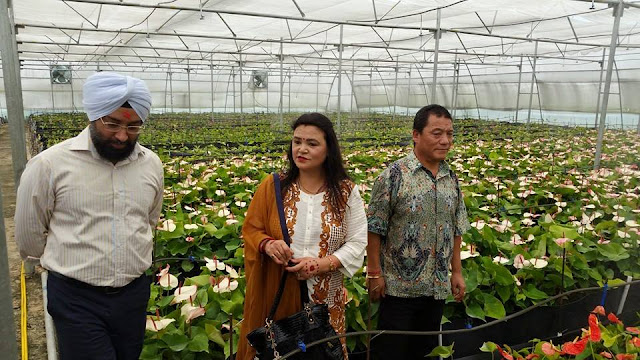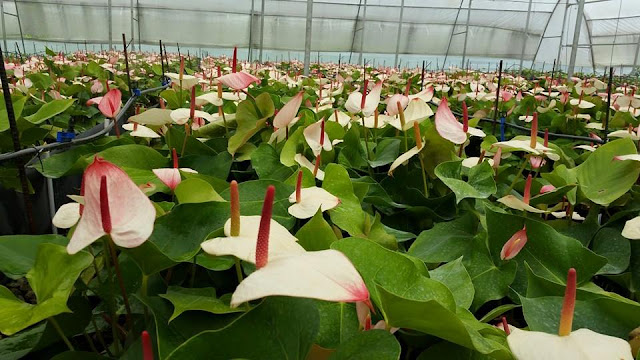The Gorkhaland Territorial Administration (GTA) has started the cultivation and marketing of the tropical anthurium flower and has plans to convert it into a brand, following in the footsteps of the Darjeeling tea. GTA chief executive Bimal Gurung inaugurated the “Darjeeling Anthurium” project at Devitar in Jamuni 16 km from Darjeling town on Tuesday.
The project estimated at Rs 2.5 crore has been set up in two ploy houses where 14 varieties of anthuriums are being cultivated. GTA had brought 50000 anthurium plants from Rigin Plants in Holland and planted them in the two ‘poly-houses.’
GTA has already got orders for 500 anthurium plants from Delhi. “It is a good beginning as we have already got orders from Delhi for the tropical anthurium plant and talks are in progress with links in Kolkata. We have also started the marketing process in other parts of the country,” said GTA Horticulture department secretary Sonam Bhutia.
Unlike in Sikkim where only three varieties are cultivated, the GTA has 14 varieties of anthuriums plants in the two ploy houses at Jamuni. The 14 varieties are according to the different colours. These include princess alexia mint, princess alexia red, first yellow, first red, orange queen and mick jagger among the others.
GTA will set up a cold storage room at Chowrastha with sale counter to market and promote the anthuriums, locally. “We are planning to start sell of the plant locally from October, later this year. The project is feasible because of helpful climate of the region and also because these plants can be grown throughout the year,” Bhutia said.
This was the first phase of the project and plans were also afoot to establish a horticulture park in Darjeeling along with other ornamental plants.
GTA Horticulture senior scientific officer Mahadev Chehttri said: “There are about 50,000 plants in the two poly houses for these plans especially for the plants. Each plant can give about 10 to 12 flowers as they grow the whole year round. Annually, we will be able to generate about 500,000 of cut flowers and sold at Rs.15 to 20 for each cut flower, according to the market price”. According to Chhetri, the plants could survive for about seven years and the flowers could be kept roughly for about six weeks after being cut.
The GTA chief executive was positive that the project would be successful but said a lot more was needed to be done. “The project has been made at a cost of Rs 2.5 crore and there are more things need to be done here like fencing for which more funds will be required. The project here will not only generate employment and revenue but we feel that it will also encourage farmers to grow such plants, “he said.
Gurung was also of the opinion that the project being near Jamuni would be an added attraction for tourists visiting the area. The council is developing Jamuni as a tourist spot where a boating facility is already available with the scenic mountain back-ground and tourist huts along the Chota Rangit river. A Mughal type garden and swimming pool facilities will also developed in the coming days.
Source: EOI
 |
| “Darjeeling Anthurium” started by GTA at Devitar in Jamuni |
GTA has already got orders for 500 anthurium plants from Delhi. “It is a good beginning as we have already got orders from Delhi for the tropical anthurium plant and talks are in progress with links in Kolkata. We have also started the marketing process in other parts of the country,” said GTA Horticulture department secretary Sonam Bhutia.
 |
| Anthurium at “Darjeeling Anthurium” |
GTA will set up a cold storage room at Chowrastha with sale counter to market and promote the anthuriums, locally. “We are planning to start sell of the plant locally from October, later this year. The project is feasible because of helpful climate of the region and also because these plants can be grown throughout the year,” Bhutia said.
This was the first phase of the project and plans were also afoot to establish a horticulture park in Darjeeling along with other ornamental plants.
GTA Horticulture senior scientific officer Mahadev Chehttri said: “There are about 50,000 plants in the two poly houses for these plans especially for the plants. Each plant can give about 10 to 12 flowers as they grow the whole year round. Annually, we will be able to generate about 500,000 of cut flowers and sold at Rs.15 to 20 for each cut flower, according to the market price”. According to Chhetri, the plants could survive for about seven years and the flowers could be kept roughly for about six weeks after being cut.
The GTA chief executive was positive that the project would be successful but said a lot more was needed to be done. “The project has been made at a cost of Rs 2.5 crore and there are more things need to be done here like fencing for which more funds will be required. The project here will not only generate employment and revenue but we feel that it will also encourage farmers to grow such plants, “he said.
Gurung was also of the opinion that the project being near Jamuni would be an added attraction for tourists visiting the area. The council is developing Jamuni as a tourist spot where a boating facility is already available with the scenic mountain back-ground and tourist huts along the Chota Rangit river. A Mughal type garden and swimming pool facilities will also developed in the coming days.
Source: EOI















